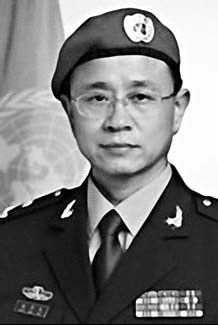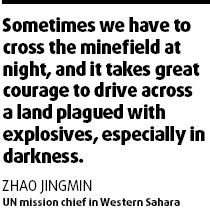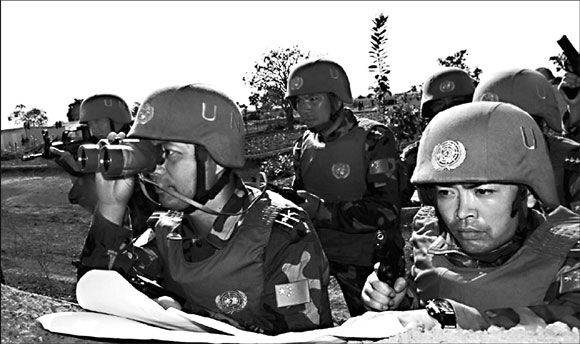Surviving in the sand
|
Chinese soldiers take part in a UN peacekeeping mission in Sudan. China has participated in 17 UN peacekeeping operations since 1990. Kui Zhang |
Desolate and largely uninhabited, the Western Sahara is a sea where temperatures can reach as high as 47 C in October. In this desert, Major General Zhao Jingmin is on his second service term, not as a military observer, as he first came here 16 years ago, but as the chief of the UN mission for the referendum in Western Sahara (MINURSO).
Zhao, China's first senior military officer to head a United Nations peacekeeping mission, was appointed in September by UN Secretary-General Ban Ki-moon as force commander of MINURSO, to succeed General Kurt Mosgaard of Denmark.
"The appointment has shown the UN's trust in the capabilities of Chinese military officers and its full recognition of China's 17 years of active participation in UN peacekeeping missions," Zhao said in a recent interview, in Rabat.
Western Sahara, a mostly desert region, is located on the northwest African Atlantic coast. The region has witnessed a decade-long war in the past century between Morocco, which currently controls Western Sahara, and the Algeria-backed Popular Front for the Liberation of Western Sahara.
The UN peacekeeping mission has been stationed there since 1991 to monitor the ceasefire between the conflicting sides and organize a referendum on the future of Western Sahara. However, the referendum has been delayed as disagreements persist between the warring parties and the mandate of MINURSO has been renewed repeatedly.

MINURSO currently consists of more than 230 military observers, 13 of whom are Chinese. The main duty of the observers, who have set up posts along a 1,500-km wall of sand, is to supervise the ceasefire.
Desert missions are grueling and 16 members have lost their lives during operations since MINURSO was founded.
Zhao says that an observer has to carry out three patrols a day, with each one as far as hundreds of kilometers from the base. Some have to camp out at night as the patrol must be kept around the clock. Spending the night with just a sleeping bag, the soldiers frequently have visitors like serpents and scorpions.
However, what really threatens their lives are landmines and other unexploded bombs left by previous conflicts, Zhao says.
When on patrol, the observers have to strictly follow the pre-designed routes using GPS navigation, or follow traces left by vehicles from the previous patrol. As winds are strong in the desert, the traces can easily be covered up and even the landmines can move with the flowing sand.
"Sometimes we have to cross the minefield at night, and it takes great courage to drive across a land plagued with explosives, especially in darkness," Zhao says.
The observers must undertake specialized training to get themselves both technically and psychologically ready for the demanding and dangerous tasks.
"As we don't have armored jeeps for the patrols, our staff came up with an invention of their own - using bulletproof vests as seat cushions," Zhao says. The vest on the seat can fend off shrapnel from a triggered landmine.
Apart from the dangers, poor water supply is another problem. In the desert, water from the wells is high in minerals and when mixed with shampoo, "it makes the hair feel stained with wax", says the mission chief.

Although the natural environment in Western Sahara is as unfavorable as 16 years ago, the living conditions for the peacekeepers have become better. "We now have air-conditioning in the tents and hot water for baths. That was just unimaginable at the time of my first service term here," he says.
No direct conflict has broken out between the two warring sides in Western Sahara over the past 16 years of UN involvement in peacekeeping, Zhao says, calling it the biggest achievement of the UN mission there.
However, being the force commander is no easy job as the 230 military observers come from 27 countries and have different cultural, religious and historic backgrounds.
He has made calls to all sub-divisions of the mission since taking office to better know his staff and has also paid visits to high-ranking officials of the warring parties and the embassies concerned, to familiarize himself with the region's situation.
He also urges the peacekeepers to study the UN resolutions on the problem of Western Sahara as well as the related agreements the UN has signed with the parties, to make sure all members fully understand the nature of their mission.
"As long as you have a deep understanding of all the documents, our peacekeepers can catch the spirit of the policies involved in the problem so as to do an even better job of supervising the ceasefire," he adds.
(China Daily 12/21/2007 page20)















